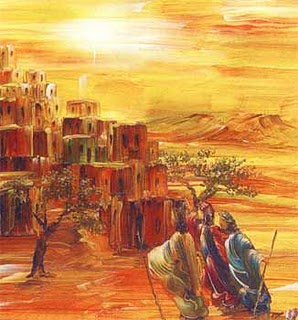Today is Epiphany.
It's also been a spectacularly bad few days for me.
I got into a car accident (everyone is fine, thank God). I lost a notebook that was a gift to me and which contained song lyrics and notes on my CD. I had to deal with my insurance company. Again. And, just to top it all off, Metro is single-tracking on the Red Line today. What joy.
So it would be a fair question to ask why I care so much about Epiphany, one of the less widely known church celebrations and one which mainly seems to mark the end of the Christmas season.
Well, I'll give it a shot.
First of all, about Epiphany. The word comes from Greek, meaning "manifestation." In the Eastern churches it's also called the Feast of Theophany, or "vision/revelation of God." So that's fun.
To be brief, Epiphany is the celebration of the "wise men" (no number is given in Matthew's account, and the story doesn't appear in any other gospel) discovering Jesus by following a star. That's the basics.
Why care?
Well, here's a few reasons why I think it's worth pondering.
First is the light. The shining light above what must have been a very modest house--maybe no more than a cave--leading the adventurers from far away onward. And the light that shines in each of our lives, leading us onward. And the way that this light is a reflection of that which shines in the darkness and is not overcome. No matter what. Even during stupidly bad days, but even more importantly even during wars and rumors of war, even during famine, even during oppression. The light still shines, for those who will look for it, providing illumination-if only for the next step. It's amazing what those in prison for resisting oppression--Gandhi, Dietrich Bonhoeffer, Martin Luther King, Adolfo Perez Esquivel--describe about their experiences. The whole thing sounds terrifying to me, and yet these and many like them report what to me is shocking inspiration, renewed commitment, light for the journey. Even in the midst of torture. It's heartbreaking, and stunning, to consider.
So each of us can see and can follow the light celebrated on Epiphany, and that's one reason to care.
Here's another. The much-romanticized narrative of "We Three Kings" is actually intensely political. Foreign travelers, not fully understanding the power dynamic occurring in first century Palestine, follow the star as much as they can until they eventually try going to the capital city and asking the person in charge. Problematically, the person in charge is Herod, a petty king and puppet of the Roman Empire. Herod sends them on their way but is threatened by any talk of a "King of the Jews" or "Messiah," and he secretly plots to kill the kid--by killing any kid Jesus' age. The kings find the toddler but are warned in a dream not to go back to Herod, while Miriam and Yusef and little baby Yeshua become political refugees, fleeing to Egypt under cover of darkness. (The Eastern church, as an aside, takes this flight narrative very seriously, and has shrines and monasteries scattered across the Sinai Peninsula). And so this story aligns the traditions and celebrations of the church with political refugees, with victims of mass violence, and with threats to earthly power. Pretty intense stuff.
And then finally there's the wise men themselves, who were astrologers, probably from Persia, maybe Zoroastrian. Definitely not Jewish, definitely not the "home team" for those reading the narrative. It would be like....well, it would be exactly like that, like Iranians with a different language and religion showing up to our Christmas services. (This, by the way, happens at Dumbarton, and we're sort of excited about it). Epiphany is a universalist celebration, a proclamation that people from anywhere on the planet can see the light and follow it. There are no entrance requirements. The wise men don't get baptized (although something very much like communion, with expensive gifts given to an impoverished family taking the place of bread and wine). We would be wise to consider this message when we are designing our outreach strategies, when we are pondering who should be in and who should be out.
So I care about Epiphany, in the middle of all this anxiety, exactly because I need it in the middle of all this anxiety. I need its light. I need its message of hope in a world seemingly run by forces of violence and greed. And I need its universal message, because days like these I feel like maybe I'm an outsider, and this story declares that everyone's in.
Epiphany. It's the end of Christmas. But it ain't so bad.

--
The wonderful artwork is from Zaki Baboun, a Palestinian artist who is also famous for his paintings of the Wall around Bethlehem:

--
David Hosey is a seminary student, a songwriter, a gentleman, and a scholar. He blogs at City of...

No comments:
Post a Comment